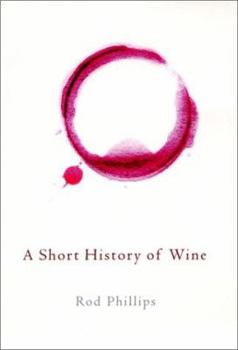A Short History of Wine
Select Format
Select Condition 
Book Overview
Variously regarded as a sacred, religious drink, inebriant, and even the work of the Devil, wine has always been much more than a commodity. From its origins in ancient Mesopotamia to its present incarnation as a vast, multinational business, wine has consistently generated passions that verge on mania.In A Short History of Wine, Rod Phillips sets out to tell the story of wine in the Western world with all its grandeurs and miseries. Packed with fascinating stories, unexpected insights, and the myriad tricks of the trade, A Short History of Wine is an essential book for anyone who treats wine with the zeal it deserves. Phillips re-creates each of the great eras of wine production, from the prehistoric fruits of the Fertile Crescent to this decades explosion of the consumer wine culture with its varied values and palates, and vividly conveys the sheer magnitude of wine consumption and enjoyment. Among the many engaging themes that Phillips explores is the endless struggle between nature and nurture -- is wine the pure product of the grape, or should it be enhanced by the addition of other substances? He revisits times when wine was a favorite among the American Founding Fathers (Ben Franklin praised it, as a God-given boon), and he sheds light on wines enemies, both natural and human, recalling dark times when disease struck vineyards, counterfeiting and fraud ran rampant, and anti-alcohol movements peaked.Spanning the globe from Hunter Valley to the Rhine, from Napa Valley to Burgundy (not overlooking Peru and Ohio), A Short History of Wine is an astonishingly enjoyable guide to the social, cultural, and economic worlds inside a bottle.
Format:Hardcover
Language:English
ISBN:0066212820
ISBN13:9780066212821
Release Date:October 2001
Publisher:Ecco Press
Length:400 Pages
Weight:1.45 lbs.
Dimensions:1.3" x 6.0" x 8.8"
Customer Reviews
2 ratings
Interesting choices
Published by Thriftbooks.com User , 18 years ago
A 'history' of wine is necessarily a matter of elimination. What to leave out? What to include? Rod Phillips has chosen to focus on the political and social context in which wine and the wine trade developed. Fortunately, wine is at least as much a cultural product as an agricultural one so his effort is both appropriate, necessary and a bit overdue. The author is a historian, so we get sharp attention paid to some things that are left out of most wine histories: *aside from Patrick McGovern's Ancient Wine, no one has done as literate a treatment of the questions surrounding wine in prehistory and the Classical Period. It's refreshing to see an author acknowledge the Mycenaean roots of winegrowing in the Mediterranean. *in a very few pages, the author deals with the intricate nature of the relationship between Bordeaux and England. In the course of the explanation, he underlines the significance of trade in the development of wine regions and styles. *the chapter called Wine and Its Enemies quite rightly deals with anti-wine forces in the natural world (phylloxera) and in the cultural world (prohibition). *the chapter on the wine revival in the late twentieth century gives due emphasis to the rôle of corporate mergers and huge drinks companies in the development of wine. The author is on less sure footing here with the cultural underpinnings of the wine revival. Did the upheavals of the Sixties have anything to do with it? Is this not also the time of a wine decline as consumption decreases in wine's traditional european homelands? This book would have benefitted from closer proofreading and a slightly more generous application of maps. On the other hand, the cover is a work of pure genius. I have never seen a wine book cover that so effectively evoked wine's pleasures, its wetness and (yes) its redness. --Lynn Hoffman, author of THE NEW SHORT COURSE IN WINE and the forthcoming novel bang-BANG from Kunati Books ISBN 9781601640005
World History from the viewpoint of wines
Published by Thriftbooks.com User , 21 years ago
This is definitely an exciting book for anybody interested not only in wines but also in history. With a bit more than 300 pages Rod Phillips paints a fascinating journey of wine from its unknown origins the politico-economic-cultural-medical scenes of today. The task is not small. Rod Phillips does an excellent job. To write history of this nature you must be a historian, which is the author's trade; without this background the intricate connections between world history and wine would remain shallow. In a way the book is a (limited) view on world history. The book is well written and contains many delightful stories in the long history of wine. I would have enjoyed the book even more if some additional editorial work had been done. For a reader the trends and economic significance of wine could have become more clear with tables or figures summarizing the abundant information contained in the book which is further blurred by the unsystematic usage of measures; litres, hectolitres, gallons, not to speak about ancient hard-to-understand measures are being used in parallel complicating matters unnecessarily. I personally would have appreciated a sepatate treatement of vines. I am sure wine tastes different after having read this delightful little book.






